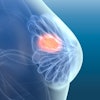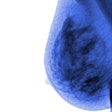
Survival rates for obese women with early stage breast cancer are particularly bleak, according to a study presented Wednesday at the American Society for Therapeutic Radiology and Oncology (ASTRO) meeting in Atlanta.
While obesity is a known risk factor for primary breast cancer, the prognostic influence of excessive weight on cancer outcomes remains unclear, stated Dr. Penny Rawdin Anderson and colleagues from the Fox Chase Cancer Center in Philadelphia.
"Based on our study, we are basically saying to maintain your ideal body weight because your weight at the time of diagnosis can affect the outcome," Anderson said in a telephone interview with AuntMinnie.com. "The idea is to intervene so that women optimize and maintain their ideal body weight, prior to developing breast cancer."
Between 1978 and 2003, Anderson's group followed 2,010 women with stage I or II breast cancer. The patients had undergone treatment with lumpectomy and axillary dissection, as well as radiation therapy with or without systemic therapy. Using Quetelet's Index (similar to body mass index or BMI), the cutoff for obese women was a QI of greater than 4.
At the time of cancer diagnosis, 35% of the patients in the study were considered obese, and 43% were overweight (QI of less than 4, but greater than 3.2). The obese weight group consisted of older, postmenopausal women (the median age was 59).
Cox multivariate regression models were used to determine distant metastases (DM), cause-specific survival (CSS), and overall survival (OS). According to the results, the actuarial five-year rate of DM was 10% for the obese group, 93% for CSS, and 88% for OS. In comparison, for the overweight group the actuarial five-year rates for DM, CSS, and OS were 6%, 95%, and 92%, respectively. For those at normal weight (QI of 0 to less than or equal to 3.2), the rates were 7%, 96%, and 92%.
Based on the regression model, "obesity was found to be a statistically significant independent predictor of increased distant metastases (p = 0.0145) and worse cause-specific survival (p = 0.0060)," the group concluded. They recommended that weight-control interventions should be implemented with these patients as obesity may substantially affect breast cancer outcome.
Earlier this year, a study in the Archives of Internal Medicine found that the specificity of screening mammography was lower among obese women -- compared to those of normal weight and low weight -- partly because of denser, fattier breasts. The group, from the University of Washington in Seattle, pointed out that obese women have a higher risk of breast cancer and tend to be diagnosed at later stages of the disease (Archives of Internal Medicine, May 24, 2004, Vol. 164:10, pp. 1140-1147).
Another paper, from Massachusetts General Hospital in Boston, found that obese women begin breast cancer screening later than thinner women, as late as two years after the recommended age for screening (Cancer, September 13, 2004).
However, Anderson said that, based on her study results, the timing and quality of screening may not be a major factor in how obese women fare.
"In our study, it's important to point out that when I looked at all the patient characteristics in the three weight groups, the more obese women did not present with more advanced-stage disease, bigger tumors, or more positive lymph nodes," Anderson explained. "From weight group to weight group, they were (all) presenting the same."
By Shalmali Pal
AuntMinnie.com staff writer
October 6, 2004
Related Reading
Many women get first mammogram, delay further ones, September 13, 2004
High-carb diet may increase breast cancer risk, August 11, 2004
Heart disease risks tied to fat distribution in women, May 27, 2004
False positive mammography findings more common in obese women, May 25, 2004
Copyright © 2004 AuntMinnie.com


















